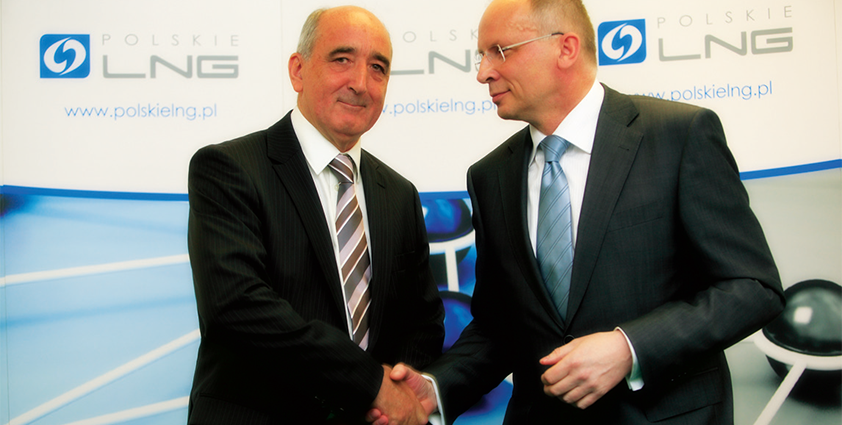
Polskie LNG
First of its kind
Polskie LNG is to construct and operate an LNG terminal in Poland enabling the off-take of natural gas commencing mid 2014.
As a strategic investment for the interests of the country as a whole, compliant with its diversification plans for sources and roads supplying natural gas, the facility will make it possible to diversify the directions of natural gas to areas such as the Middle East, North Africa and Scandinavia. Today all the technical and economic documentations, as well as all of the necessary administrative permits and licenses are obtained.
“The LNG terminal construction will make Poland independent in choosing the directions of its natural gas supply,” said Zbigniew Rapciak, the CEO of Polskie LNG. “Thanks to this facility we will be able to off-take gas by sea. The LNG terminal construction is to be the first of its kind in this part of Europe.”
In July 2010, the project reached an important milestone with the signing of the terminal contract with the contractor consortium made up of Saipem SpA. from Italy, Saipem SA of France, Techint Compagnia Technia Internazionale SpA from Italy, Snamprogetti Canada Inc, PGB SA and PBG Export Ltd., both from Poland. With an impressive combined experience that includes the installation of terminals in all areas of the globe, the consortium is confident that it will deliver the completed terminal, ready for operation, by June 2014. Construction works will begin in the second half of 2010.
In the first stage of operation, the LNG terminal will enable the re-gasification of 5.0 billion cubic metres of natural gas annually. In the next stage, depending on the increase in demand for gas, it will be possible to increase the dispatch capacity up to 7.5 billion cubic metres without the need to increase the area on which the terminal is being built. The construction of two standard-sized containers is also planned for the LNG terminal in Poland and these will boast a gross capacity of over 160,000 cubic metres. The first 1.5 billion cubic meters of gas per  year has already been contracted from Qatargas and the first delivery is scheduled for July 2014. The terminal will be adapted for LNG tankers with a capacity of 120,000 to 216,000 cubic meters. For the purpose of the discharge site, the Q FLEX type has been adopted for the best fitting ship size of a total length of 315m, a width of 50m and an immersion depth of the tanker filled with LNG up to 12.5 m.
year has already been contracted from Qatargas and the first delivery is scheduled for July 2014. The terminal will be adapted for LNG tankers with a capacity of 120,000 to 216,000 cubic meters. For the purpose of the discharge site, the Q FLEX type has been adopted for the best fitting ship size of a total length of 315m, a width of 50m and an immersion depth of the tanker filled with LNG up to 12.5 m.
It will be the part of the investment, known in Polish as ‘gazoport’ (marine gas terminal), which will open up opportunities for importing gas to Poland by new operators and its trans-shipment to customers in the Baltic Sea area. With a large number of potential suppliers and the flexibility provided by marine transport, the Polish and Scandinavian gas market may gain access to deliveries from all around the world.
The LNG terminal in Poland will offer regasification services on TPA (Third Party Access) basis according to the rules of non-discrimination and transparency. All the interested parties are invited to apply for the available capacity on the basis of the following documents: Terminal Instruction, Regasification Framework Agreement and Indicative tariffs, and are urged to visit www.polskielng.pl/open season for more details.
The European LNG training centre in Poland
The LNG terminal service and operation require top class specialists both on shore as terminal service staff and at sea, as vessel crew members. Therefore, Polskie LNG and the leading Polish maritime and technical universities have developed a training programme for the education of LNG terminal marine and technical staff including international certification – the European LNG Training Centre with new, cutting-edge technology (state-of-the-art simulators). Establishing the centre will give a unique opportunity to gain the qualifications desired by the terminal operators worldwide. Today only two centres operate in Europe with 3000 professionals requiring certificates at regasification terminal throughout Europe. The Polish Centre will commence operations in 2011.
“We want to take advantage of the existing gap in the European market and create a centre educating professional personnel for the rapidly growing LNG market in the European Union,” said Zbigniew.
The Centre will operate according to International Convention STCW 78/95 which defines: the scope and objectives of education processes, the level of knowledge, skills and examination, requirements for various courses and also curricula of marine education. The courses will comply with the requirements of STCW, SOLAS and MARPOL Conventions.
Polskie LNG
Services: LNG terminal